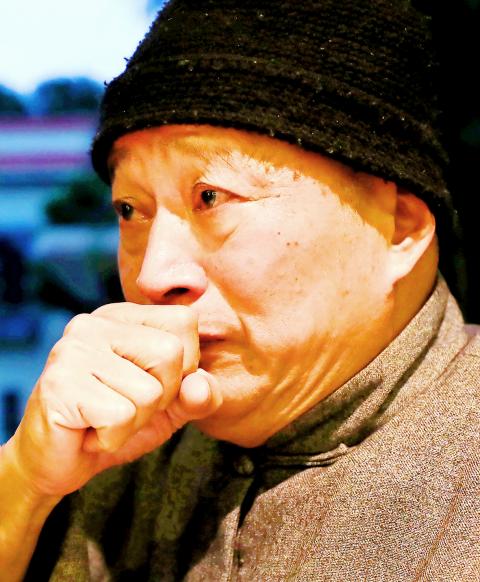Huang Ping-fan (黃屏藩) was in elementary school in 1959, when his parents and five others were convicted of murdering a man inside his parents’ Taipei hotel.
The case, known as the “Wuhan Hotel incident,” is considered by some to be one of the most egregious miscarriages of justice during the White Terror era from 1949 to 1987.
Nearly six decades later, on Dec. 6, Huang, now 69, and his 90-year-old mother, Yang Hsun-chun (楊薰春), who is the last surviving defendant, handed a petition to the Presidential Office to overturn the conviction.

Photo: CNA
They are placing their hopes in President Tsai Ing-wen (蔡英文), who backed the passage on Dec. 5 of the Act on Promoting Transitional Justice (促進轉型正義條例).
Huang said that although he was brought up in a wealthy family and his parents ran one of the most luxurious hotels in Taipei, after the incident, he was labeled the son of a “communist spy” and a murderer.
“I hope President Tsai proves that her administration is different by how she handles this case,” Huang said.
His family petitioned for a review of the case during former president Chen Shui-bian’s (陳水扁) term, but to no avail, he said, adding that the passage of the act was a “ray of hope.”
In July 1959, Wuhan Hotel manager Yao Chia-chien (姚嘉薦) was found dead inside the hotel. Police and prosecutors originally ruled it a suicide, but months later, the Criminal Investigation Bureau decided he was killed.
Seven people, including Huang’s father, Huang Hsueh-wen (黃學文), Yang, several employees, a guest at the hotel and National Taiwan University professor Chen Hua-chou (陳華洲) were arrested and charged with murder.
The bureau allegedly tortured the seven defendants to elicit confessions of being communist spies or murderers. Despite being convicted of murder and jailed, all seven defendants between 1960 and 1976 repeatedly stated their innocence and appealed the sentence.
Former Control Yuan member Tao Pai-chuan (陶百川) listed the incident and the “Lei Chen (雷震) incident” as the two most infamous miscarriages of justice in Taiwan.
Some have speculated that then-president Chiang Kai-shek (蔣介石) might have been behind the bureau’s intervention, because Chen Hua-chou was a close ally of Lei, a high-ranking Chinese Nationalist Party (KMT) official and adviser to Chiang, who was imprisoned for treason because of his support for democratic reforms.
Others have speculated the hotel case was the result of clashes between the bureau and the National Police Agency.
The case raised too many questions, such as the disappearance of the original forensic report that ruled Yao’s death a suicide after it was sent to Japan for further examination, Huang Ping-fan said.
Huang Hsueh-wen was sentenced to death multiple times, but in 1974 was granted medical parole and fled to the US.
After his case was dismissed in 1995, Huang Hsueh-wen returned to Taiwan to demand redress from the bureau for extorting confession by torture.
The Supreme Court later rescinded the dismissal and sentenced Huang Hsueh-wen to life imprisonment, prompting him to flee once again.
Many files have been lost over the decades, Formosa Statehood Movement founder David Chou (周威霖) said, adding that the case might need to be resolved through political rather than judicial means.
After meeting with Presidential Office Deputy Secretary-General Yao Jen-to (姚人多), Chou said he believes the case is finally being taken seriously.
Presidential Office spokeswoman Chang Wen-lan (張文蘭) said after the meeting that the Executive Yuan is required by the new law to establish an ad hoc committee to implement transitional justice measures to address matters such as the Wuhan Hotel case and others.

Taipei has once again made it to the top 100 in Oxford Economics’ Global Cities Index 2025 report, moving up five places from last year to 60. The annual index, which was published last month, evaluated 1,000 of the most populated metropolises based on five indices — economics, human capital, quality of life, environment and governance. New York maintained its top spot this year, placing first in the economics index thanks to the strength of its vibrant financial industry and economic stability. Taipei ranked 263rd in economics, 44th in human capital, 15th in quality of life, 284th for environment and 75th in governance,

The Sports Administration yesterday demanded an apology from the national table tennis association for barring 17-year-old Yeh Yi-tian (葉伊恬) from competing in the upcoming World Table Tennis (WTT) United States Smash tournament in Las Vegas this July. The sports agency said in a statement that the Chinese Taipei Table Tennis Association (CTTTA) must explain to the public why it withdrew Yeh from the WTT tournament in Las Vegas. The sports agency said it contacted the association to express its disapproval of the decision-making process after receiving a complaint from Yeh’s coach, Chuang

Control Yuan Secretary-General Lee Chun-yi (李俊俋) tendered his resignation last night, admitting that he had misused a government vehicle, as reported by media. His resignation was immediately accepted by the Control Yuan. In a statement explaining why he had resigned, Lee apologized for using a Control Yuan vehicle to transport his dog to a pet grooming salon on May 20. The issue first came to light late last month, when TVBS News reported that Lee had instructed his driver to take the dog to the salon. The news channel broadcast photos that it said were taken by an unnamed whistle-blower, which purportedly showed the

A former officer in China’s People’s Liberation Army (PLA) who witnessed the aftermath of the 1989 Tiananmen Square massacre has warned that Taiwan could face a similar fate if China attempts to unify the country by force. Li Xiaoming (李曉明), who was deployed to Beijing as a junior officer during the crackdown, said Taiwanese people should study the massacre carefully, because it offers a glimpse of what Beijing is willing to do to suppress dissent. “What happened in Tiananmen Square could happen in Taiwan too,” Li told CNA in a May 22 interview, ahead of the massacre’s 36th anniversary. “If Taiwanese students or